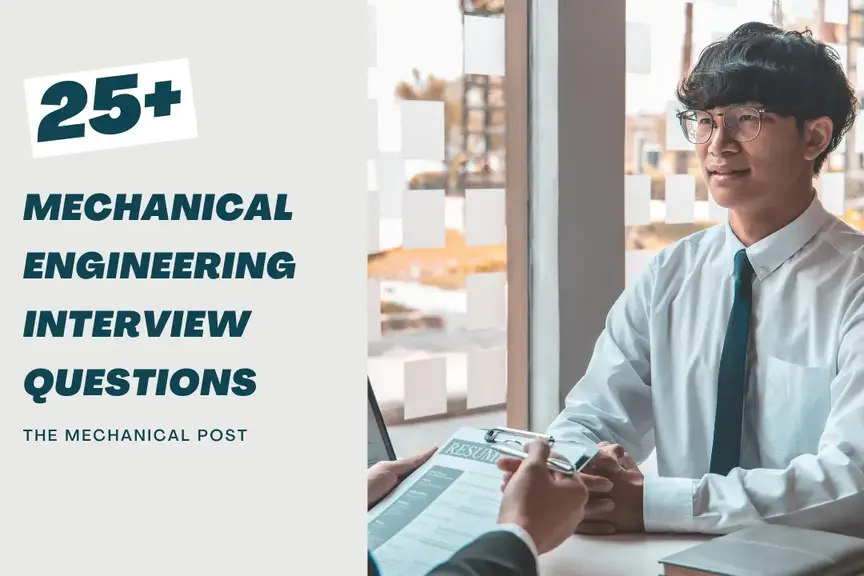
Welcome to our comprehensive list on the top 30 mechanical engineering interview questions and answers along with examples! If you’re a mechanical engineering student who is just starting out or a professional candidate preparing for an upcoming interview, you’ve come to the right place, the Ultimate website for Mechanical Engineers- The Mechanical post.
Interviews can be nerve-wracking, but with proper preparation and understanding of the most commonly asked questions, you can boost your confidence and increase your chances of success.
Why should I refer to mechanical engineering interview questions and are they important?
Well Yes! they serve as a bridge between your technical knowledge and the employer’s evaluation of your suitability for the job. Preparing for Interview questions not only assess your expertise in the field but also gauge your problem-solving skills, critical thinking abilities, and your ability to communicate complex ideas effectively.
Also, Don’t forget to grab your FREE PDF on Mechanical Engineering Interview Questions with Answers! It’s available for download at the end of the article. Happy interviewing!

As you embark on your journey to mastering mechanical engineering interview questions, it’s essential to note that these questions can vary depending on the industry and position you’re applying for.
Mechanical engineering in itself is a wide range of disciplines, consisting of automobiles, aerospace, manufacturing, HVAC, and more. Therefore, it’s crucial to tailor your responses to match the specific requirements of the role you’re seeking.
In this list, we’ll provide you with an overview of the most common mechanical engineering interview questions and equip you with well-crafted sample answers for better understanding. By familiarizing yourself with these questions and practicing your responses, you’ll be better prepared to impress potential employers and land your dream job.
We’ve divided the most commonly asked Interview questions into 6 major categories:
Technical Knowledge Questions
Problem Solving Questions
Industry Specific Questions
Behavioral and Soft Skills Questions
So, let’s learn about the mechanical engineering interview questions and unlock the knowledge and strategies that will help you excel in your upcoming interviews. Whether you’re a recent graduate or an experienced professional looking for a new opportunity, this list will serve as a valuable resource to enhance your interview performance.
6: Explain the concept of tolerance in mechanical engineering.
7: What are the key factors to consider when designing a mechanical component?
8: Describe your experience with CAD software.
9: How do you ensure quality control in a mechanical engineering project?
10: What are the differences between fluid mechanics and thermodynamics?
11: Walk us through your approach to solving complex engineering problems.
12: Describe a situation where you encountered a technical challenge and how you resolved it.
13: How do you prioritize tasks and manage time when working on multiple projects?
14: Explain a time when you had to make a quick decision in a high-pressure situation.
15: Share an example of a project where you had to collaborate with cross-functional teams.
16: What are the latest advancements or trends in the field of mechanical engineering?
17: How do you stay updated with the evolving technology and industry practices?
18: Discuss your experience in working with [specific industry or sector].
19: What are the key challenges you foresee in the [specific industry] and how would you address them?
20: Can you provide an example of a project where you applied industry-specific standards or regulations?
21: Tell us about a time when you had to resolve a conflict within a team.
22: How do you handle constructive criticism or feedback?
23: Describe a situation where you demonstrated leadership skills.
24: How do you manage time and prioritize tasks in a fast-paced work environment?
25: Share an example of a time when you had to adapt to unexpected changes or challenges.
26: Where do you see yourself in the next five years as a mechanical engineer?
27: What steps are you taking to further develop your technical skills and knowledge?
28: Describe any specific certifications or additional qualifications you are pursuing or plan to pursue.
29: How do you stay motivated and continue learning in your field?
30: Discuss any innovative ideas or projects you would like to pursue in the future.
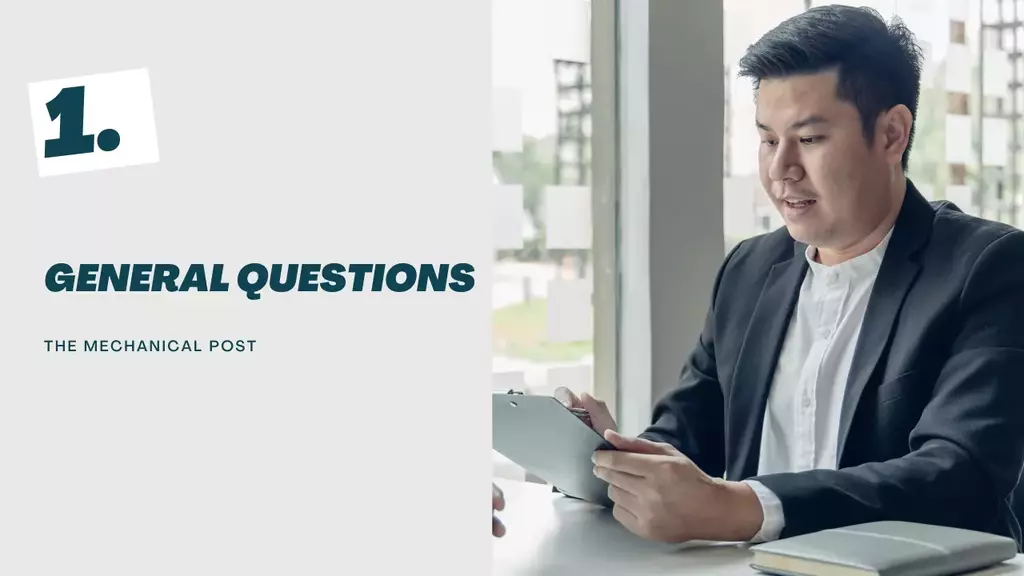
Answer: When answering this question, provide a brief overview of your background, education, and relevant experience. Focus on highlighting your achievements and skills that directly relate to the mechanical engineering field.
For example:
“I completed my Bachelor’s degree in Mechanical Engineering from XYZ University, where I developed a strong foundation in core engineering principles. During my internship at ABC Engineering, I worked on a team that designed and optimized a new HVAC system, resulting in a 20% increase in energy efficiency. Additionally, I gained experience in project management and collaboration, effectively communicating with cross-functional teams to meet deadlines and deliver high-quality solutions.”
Answer: Tailor your answer to align with the specific areas of mechanical engineering relevant to the job. Mention your expertise and any specialized skills you possess.
For example:
“I specialize in two main areas of mechanical engineering: thermodynamics and computational fluid mechanics. In thermodynamics, I have a solid understanding of energy transfer, heat exchangers, and power cycles. My experience with computational fluid mechanics allows me to analyze fluid flow behavior and optimize designs for better performance. I also have a strong foundation in structural analysis and mechanical system design.”
Answer: Choose a project that showcases your problem-solving skills, teamwork, and ability to overcome challenges. Clearly explain the project’s objectives, your role, and the outcome.
For example:
“One of the most challenging projects I worked on was designing a robotic arm for a manufacturing company specialized in Industrial Automation. Our team had to ensure precise movement, high payload capacity, and seamless integration with existing systems. To overcome the challenges, we conducted extensive research, collaborated with experts in robotics, and utilized iterative prototyping. Through our efforts, we successfully delivered a fully functional robotic arm that improved production efficiency by 30% and reduced human error.”
Answer: Mention the software tools that you are familiar with and have used previously, focusing on those relevant to the job you’re applying for. Provide examples of projects or tasks where you utilized these tools effectively.
For example:
“I am proficient in several software tools commonly used in mechanical engineering, including CAD software such as SolidWorks and AutoCAD for 3D modeling and design. I have extensive experience using finite element analysis (FEA) software like ANSYS to simulate and analyze structural behavior. Additionally, I am skilled in using MATLAB for data analysis and programming in Python for automation tasks.”
Answer: Describe your systematic problem-solving approach, highlighting steps such as analysis, ideation, and testing. Provide a specific example to illustrate your process.
For example:
“When faced with a problem in a mechanical engineering context, I adopt a systematic approach. First, I gather all relevant information and thoroughly analyze the problem to understand its root causes. Next, I brainstorm potential solutions and evaluate their feasibility. To ensure the best outcome, I often create prototypes or conduct simulations to test and validate the chosen solution. One instance where I applied this approach was when optimizing a gear system for a machinery application. By carefully analyzing the system’s requirements, exploring design alternatives, and conducting iterative testing, we achieved a 20% increase in overall efficiency.”
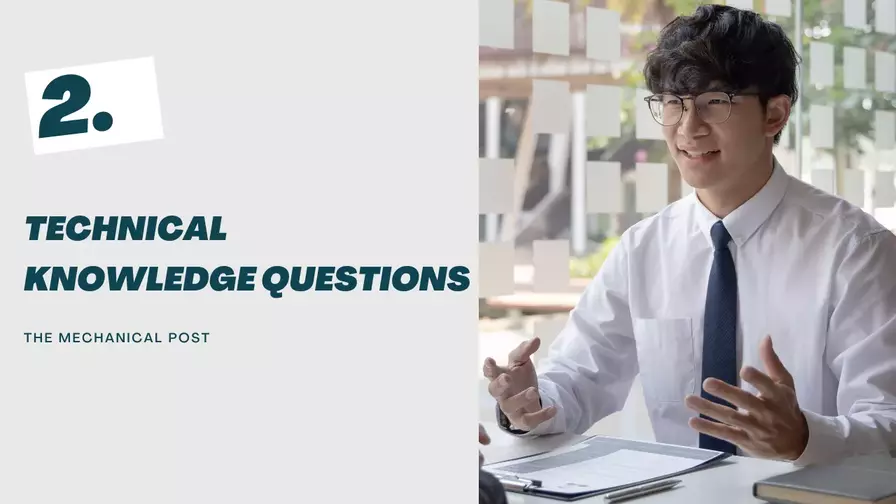
Answer: Tolerance refers to the allowable variation in dimensions or properties of a mechanical component. It ensures that the manufactured parts fit together as intended and perform their intended functions. In mechanical engineering, precision and accuracy are vital, and tolerance plays a crucial role in achieving them.
For example:
when designing a precision shaft for an automotive application, tolerances for diameter, roundness, and surface finish are considered. By specifying tight tolerances, we ensure that the shaft fits precisely into mating components and functions properly. Tolerance analysis helps balance manufacturing costs and design specifications while achieving desired functionality.
Answer: When designing a mechanical component, several key factors come into play. Firstly, functionality is paramount. The component should fulfill its intended purpose efficiently and reliably. Secondly, material selection is crucial to ensure adequate strength, durability, and resistance to environmental conditions.
For example:
when designing a turbine blade for a gas turbine engine, materials with excellent high-temperature strength and corrosion resistance, like superalloys, are commonly chosen. Thirdly, manufacturability is essential, considering factors such as ease of fabrication, cost-effectiveness, and scalability. Lastly, ensuring the safety of the component during its lifecycle, including installation, operation, and maintenance, is of utmost importance.
Answer: I have extensive experience with CAD software, particularly SolidWorks. Throughout my academic and professional career, I have used SolidWorks to create detailed 3D models, perform simulations, and generate technical drawings.
For example:
In a previous project, I used SolidWorks to design a complex assembly for an automated packaging machine. The software allowed me to visualize the machine’s operation, identify potential interferences, and optimize the design for efficient manufacturing. SolidWorks, with its parametric modeling capabilities, enabled me to make quick design modifications and iterate rapidly to achieve the desired outcomes.
Answer: Maintaining quality control is vital in every mechanical engineering project I undertake. I pay close attention to detail and follow established standards and procedures. At the design stage, I conduct thorough reviews and simulations to identify potential flaws or weaknesses.
During manufacturing, I collaborate closely with production teams to ensure adherence to specifications and conduct regular inspections. For example, in a recent project involving the production of precision gears, we implemented a rigorous inspection process, including dimensional checks, material testing, and surface finish evaluation, to ensure each gear met the required quality standards. Additionally, I believe in continuous improvement and regularly seek feedback from stakeholders to identify areas for enhancement and implement corrective measures promptly.
Answer: Fluid mechanics and thermodynamics are two fundamental branches of mechanical engineering that address different aspects of fluid behavior. Fluid mechanics primarily deals with the study of fluids in motion, including their forces, flow patterns, and pressure distributions. It focuses on phenomena such as fluid flow in pipes, aerodynamics, and hydrodynamics.
On the other hand, thermodynamics revolves around the study of energy transfer and the relationships between temperature, pressure, and volume within a system. It covers topics like heat transfer, power cycles, and energy conversion.
To illustrate this, consider the cooling system of an internal combustion engine. Fluid mechanics helps analyze the airflow through the radiator and the behavior of coolant, while thermodynamics comes into play in understanding heat transfer between the engine and the coolant, ensuring efficient engine operation.
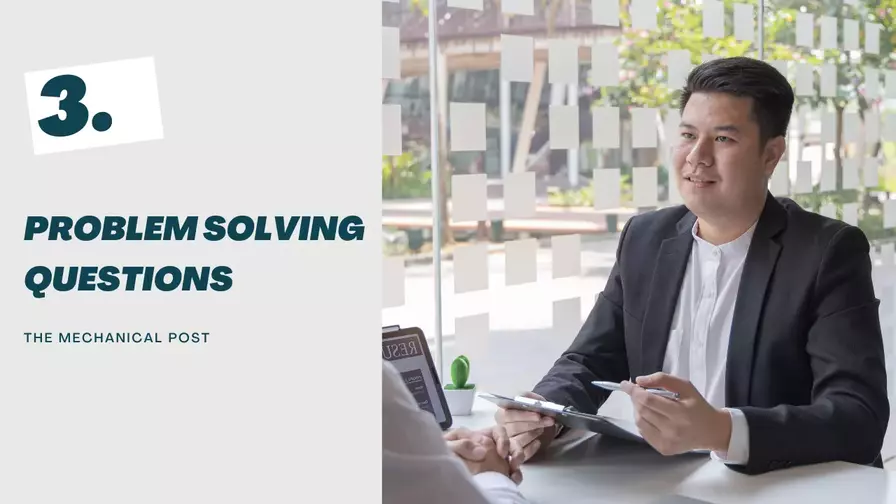
Highlight your structured problem-solving methodology, including analysis, ideation, and testing.
For example: Describe in detail about Developing a cost-effective design solution for a bridge by analyzing different materials, evaluating structural integrity, and conducting feasibility studies.
Share a specific technical challenge you faced and discuss the steps you took to overcome it.
For example: Troubleshooting and resolving a malfunctioning motor in a manufacturing line by analyzing circuitry, performing diagnostics, and implementing corrective measures.
Discuss your time management strategies, such as prioritizing tasks based on deadlines and project importance.
For example: Like successfully managing multiple projects simultaneously by utilizing tools like project management software, creating task lists, and setting realistic timelines.
Highlight your ability to make informed decisions under pressure by considering available information and potential outcomes.
For example: I acted swiftly resolving an equipment failure during a critical production process by assessing risks, consulting experts, and implementing a contingency plan.
Emphasize your teamwork and collaboration skills, illustrating how you worked effectively with individuals from different disciplines.
For example: I like collaborating with electrical engineers and software developers to integrate control systems and sensors into an automated packaging machine, ensuring seamless operation and efficiency.
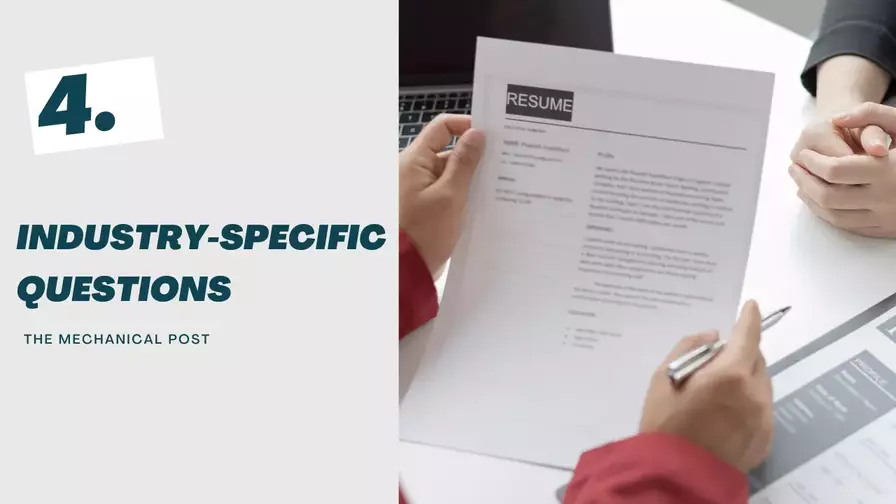
Thoroughly research the company and the position you’re applying for. Familiarize yourself with their projects, products, and recent advancements in the industry. This knowledge will demonstrate your genuine interest and enthusiasm during the interview.
Stay updated with current industry trends and advancements through research, professional networking, and attending conferences or seminars. Highlight your knowledge of emerging technologies and their potential impact on the industry.
For example: Showcase your awareness of recent developments, such as advancements in additive manufacturing techniques like 3D printing and their applications in rapid prototyping, customization, and small-batch production.
Demonstrate your commitment to lifelong learning by mentioning industry-related publications, online resources, and professional organizations you engage with. Discuss your participation in continuing education programs, workshops, or certifications.
For example, mention how you regularly follow reputable engineering journals, attend webinars by industry experts, and actively contribute to online forums or discussion groups to stay abreast of the latest technological advancements and best practices.
Tailor your response to the industry or sector mentioned in the question, showcasing relevant projects or experiences. Highlight your understanding of industry-specific challenges, regulations, and standards.
For example, your involvement in designing a renewable energy system for a solar power plant, emphasizing your familiarity with industry-specific codes and compliance requirements.
Demonstrate your industry knowledge by identifying potential challenges or trends affecting the sector. Offer proactive strategies or solutions to address those challenges.
For example, in the aerospace industry, you may mention the challenge of reducing emissions and propose the adoption of lightweight materials and alternative propulsion systems as potential solutions to mitigate environmental impact.
Share a specific project where you adhered to relevant industry standards or regulations.
Emphasize your attention to compliance and safety measures.
For example, if you worked on designing a medical device, discuss your adherence to ISO 13485 quality management standards and your understanding of regulatory requirements from bodies like the FDA or CE.
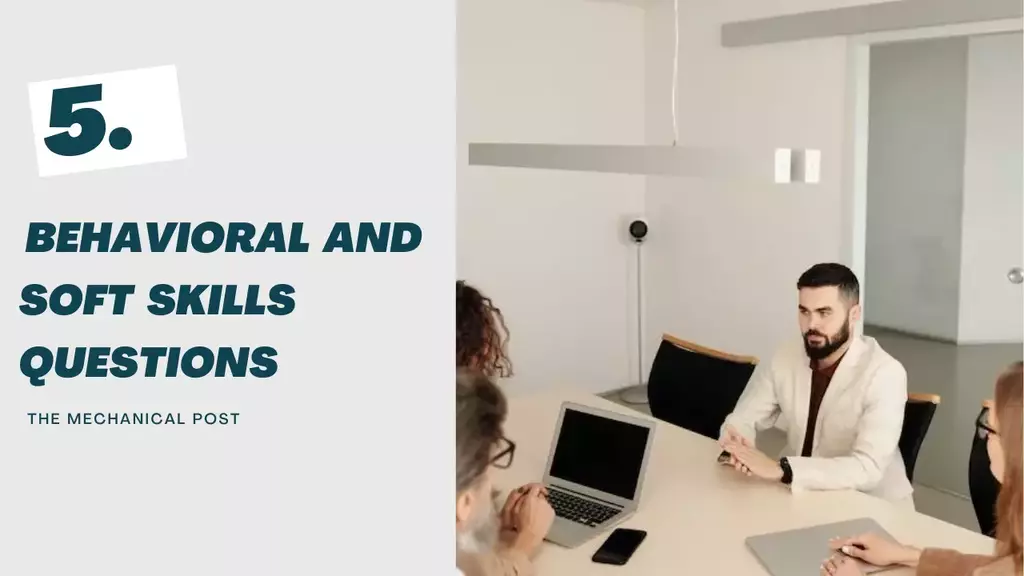
Highlight your ability to handle conflicts professionally and find constructive resolutions.
Discuss your communication and mediation skills, emphasizing the importance of maintaining a positive team dynamic.
For example, share a situation where you successfully resolved a disagreement between team members by facilitating open dialogue and finding a mutually beneficial solution.
Demonstrate your openness to feedback and continuous improvement. Emphasize your ability to listen actively, reflect on feedback, and take appropriate action.
For example of a time when you received constructive criticism, how you approached it with a growth mindset, and how you implemented the feedback to enhance your performance.
Share a specific example where you took the initiative, influenced others positively, or motivated a team to achieve a common goal.
Highlight your ability to communicate effectively, delegate tasks, and inspire others to perform at their best.
For example, discuss a project where you led a team through a challenging deadline, effectively coordinating efforts, and ensuring everyone remained focused and motivated.
Showcase your organizational and time management skills.
Discuss strategies you employ, such as creating schedules, setting priorities, and using productivity tools.
For example of a project where you successfully managed multiple tasks, met deadlines, and adapted to changing priorities without compromising quality.
Highlight your flexibility, adaptability, and resilience in the face of unexpected situations.
Discuss how you quickly adjusted your plans, identified alternative solutions, and maintained a positive attitude.
For example of a project where external factors forced a change in direction, and you successfully navigated the challenges to achieve project objectives.

Demonstrate your long-term career vision and alignment with the company’s goals.
Discuss your aspirations for professional growth, such as taking on more leadership roles or specializing in a specific area.
For example, mention your ambition to become a project manager leading innovative engineering projects that positively impact the industry.
Highlight your commitment to continuous learning and professional development. Discuss any courses, workshops, or certifications you have pursued or plan to pursue.
For example of how you recently attended a conference on emerging technologies in mechanical engineering to stay updated with the latest advancements and enhance your technical expertise.
Discuss certifications or qualifications that align with the job requirements and demonstrate your commitment to excellence. Explain how these certifications enhance your technical skills or industry knowledge.
Like for instance, mention your plan to pursue the Certified Energy Manager (CEM) certification to specialize in energy efficiency and sustainability practices within mechanical engineering.
Share your passion for mechanical engineering and your genuine interest in staying at the forefront of industry advancements.
Discuss your engagement with industry publications, webinars, or professional communities to fuel your motivation and knowledge acquisition.
Like for example of how you recently participated in a research project or attended a technical workshop to further expand your understanding of emerging technologies.
Showcase your creativity and forward-thinking mindset by highlighting ideas that could drive innovation in the mechanical engineering field.
Discuss how these ideas align with industry trends and potential impact.
For example, share your vision to develop sustainable and energy-efficient HVAC systems using advanced materials and smart control algorithms to contribute to a greener future etc.
Here are some essential tips to keep in mind while preparing for an Interview:
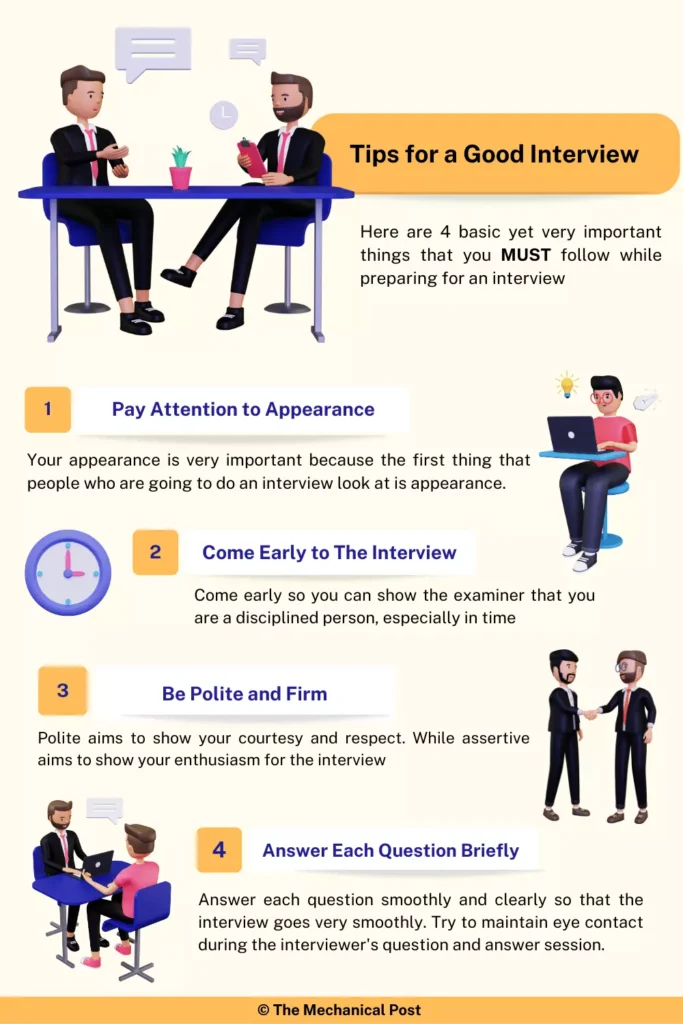
Congratulations! You have now gained valuable insights into the top 30 mechanical engineering interview questions and how to effectively answer them. By understanding the different categories of questions and having well-crafted responses, you can confidently navigate your mechanical engineering job interview.
Remember, while preparing for an interview, it is essential to tailor your responses to the specific job and company you are applying to. Practice articulating your answers concisely and confidently, ensuring that you provide relevant examples and practical insights to support your statements.
Furthermore, in addition to answering these interview questions, it is crucial to come prepared with your own questions for the interviewer. This demonstrates your interest in the role and allows you to gather information about the company and its culture.
Lastly, keep in mind that an interview is not only an opportunity for the employer to evaluate you but also a chance for you to assess the company and determine if it aligns with your career goals and values.
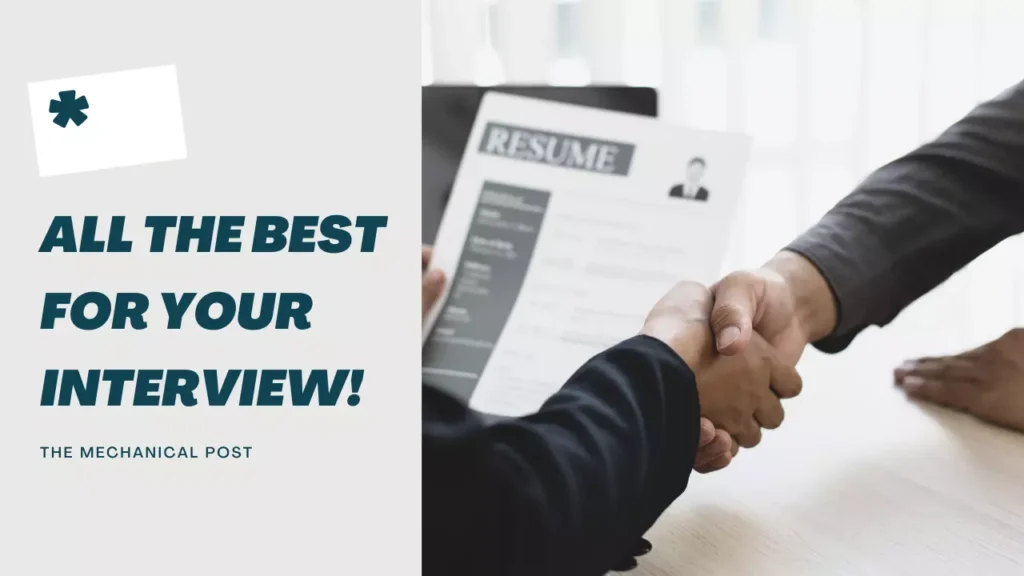
Best of luck in your upcoming mechanical engineering interviews!